Reserve Bank of Australia Annual Report – 2016 International Financial Cooperation
The Reserve Bank continues to participate actively in initiatives that seek to address the challenges facing the global economy and improve the global financial architecture. It does so through its membership of global and regional forums and its close bilateral relationships with other central banks.
Group of Twenty (G20)
Purpose
The G20 facilitates international cooperation on economic and financial policy issues.
Reserve Bank Involvement
The Reserve Bank participates in meetings of the G20 at the Governor and Deputy Governor level, covering a range of issues such as developments in the global economy and financial regulation. Senior staff participate in G20 working groups and contribute to the G20's financial regulation reform agenda.
The G20 presidency was held by Turkey from December 2014 to November 2015. In December 2015, the G20 presidency rotated to China. The key aims of China's presidency in 2016 are working ‘towards an innovative, invigorated, interconnected and inclusive world economy’. The figure below provides an overview of the Bank's involvement in the G20, which occurs principally through the meetings of central bank and finance ministry officials within the ‘Finance Track’.
G20 members have continued to update their comprehensive growth strategies, with this work being conducted by the G20 Framework Working Group. These strategies outline the policies that G20 members are undertaking in order to achieve the growth ‘ambition’ endorsed by leaders in November 2014, namely lifting the collective level of G20 GDP by at least 2 per cent by the end of 2018 relative to the International Monetary Fund's (IMF) forecast in October 2013. In 2015 and 2016, the focus has been on implementing the policies set out in the growth strategies. To complement this effort, the Chinese G20 presidency has also strengthened the structural reform agenda, including by commissioning the development of a structural reform indicator system.
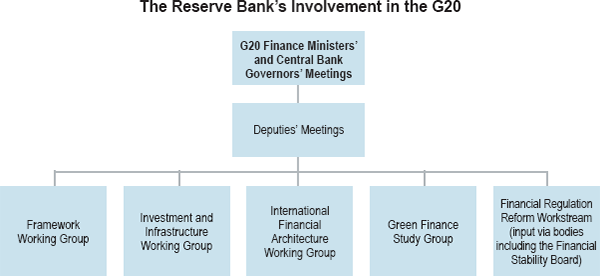
In 2015, members of the Investment and Infrastructure Working Group developed strategies to support investment in infrastructure as well as to facilitate increased investment by small- and medium-sized enterprises. In 2016, the group has aimed to encourage greater lending for infrastructure by multilateral development banks, promote cross-border collaboration on infrastructure issues and foster private sector investment.
The G20 remains committed to strengthening the international monetary system, with the Chinese presidency having reconvened the International Financial Architecture Working Group in 2016. In line with this objective, the G20 has reiterated its support for maintaining a strong and adequately resourced IMF and urged that any further realignment of IMF quota shares should increase the representation of dynamic emerging market and developing countries. Members of the G20 have also discussed a range of other ways to increase the resilience of the international monetary system, including by enhancing the monitoring of capital flows, developing improved processes to restructure sovereign debt and strengthening the global financial safety net.
A G20 Green Finance Study Group was established under the Chinese presidency in 2016. The aim of the group is to identify potential market and institutional barriers that may be discouraging capital from flowing into green projects and to analyse ways to attract private capital for green investment. The key findings of the study group will be published in a report.
Financial regulation reform continued to be an important element of the G20's agenda during the year in review, both to address the problems revealed by the financial crisis as well as potentially to mitigate new and emerging risks. The G20 and the Financial Stability Board (FSB) have an ongoing focus on several core reform areas: (i) building resilient financial institutions; (ii) ending ‘too big to fail’; (iii) addressing ‘shadow banking’ risks; and (iv) making derivatives markets safer. G20 efforts continue to emphasise implementing agreed reforms in these core areas and assessing their effects. In this role, the FSB coordinates the post-crisis response across the key international regulatory standard-setting bodies and acts as a key conduit between these bodies and the G20.
Financial Stability Board (FSB)
Purpose
The FSB promotes international financial stability by coordinating national financial sector authorities and international standard-setting bodies as they work towards developing strong regulatory, supervisory and other financial sector policies.
FSB members include representatives from 24 economies as well as the main international financial institutions – including the Bank for International Settlements and the International Monetary Fund – and standard-setting bodies, such as the Basel Committee on Banking Supervision.
Reserve Bank Involvement
The Governor is a member of the FSB Plenary (the main decision-making body of the FSB), Steering Committee and Standing Committee on Assessment of Vulnerabilities (SCAV). He was the chair of the latter throughout the 2015/16 financial year.
The Head of Financial Stability Department is a member of the Analytical Group on Vulnerabilities, while a senior staff member from Financial Stability Department participates in the FSB's Financial Innovation Network.
A senior staff member from Financial Stability Department attends meetings of the FSB Regional Consultative Group (RCG) for Asia and the Resolution Steering Group (ReSG).
A number of other staff members have participated, or continue to participate, in several FSB working groups.
As has been the case since the financial crisis, the FSB has continued to play an important role in developing and overseeing the global financial regulatory reform agenda over the past year.[1] The FSB conducts this work mainly through several committees, with overall direction provided by the FSB Plenary. The Governor and senior executives from the Reserve Bank and other Council of Financial Regulators (CFR) agencies are members of the main FSB bodies.
The FSB's agenda includes ongoing work on identifying global risks and vulnerabilities, overseeing the core post-crisis reform areas noted above, as well as considering potential reform responses to new and evolving risks. The SCAV is the main FSB body for identifying and assessing risks in the global financial system and, with the Reserve Bank Governor as chair, the Bank was heavily involved in the SCAV's activities. Supporting the SCAV is the Analytical Group on Vulnerabilities (AGV), with the FSB's Financial Innovation Network also providing input to the AGV by monitoring financial innovation in order to assess the potential for future sources of systemic risk. The possible financial stability risks posed by the asset management industry remained a focus of the SCAV and AGV early in the past financial year, with the results handed to a separate FSB group, working under the Standing Committee on Supervisory and Regulatory Cooperation, to consider policies in this area. Policy recommendations were released for consultation in June 2016. More recent areas of focus for the SCAV include developing frameworks to consider potential systemic risk implications arising from developments in financial technology (‘fintech’) and from operational risks.
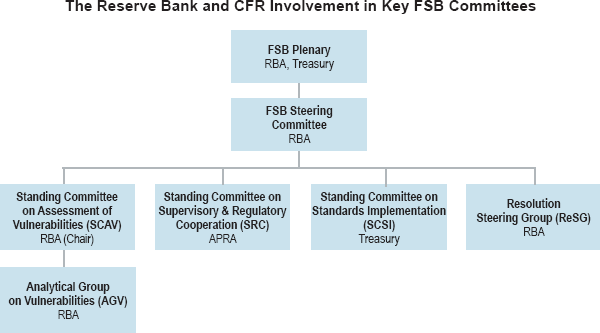
The work on asset management is linked to ongoing efforts by the FSB to address the risks posed by ‘shadow banking’ – defined by the FSB as credit intermediation involving entities and activities outside the regular banking system. Reserve Bank staff have been involved in the FSB's work on shadow banking in several ways. Staff participated in two FSB working groups: one examining potential responses to the risks posed by some shadow banking entities and securities financing transactions; and another collecting shadow banking data and assessing shadow banking risks. A senior staff member was also on the FSB peer review team that released its report on the implementation of the FSB's policy framework for other shadow banking entities in May 2016.
In addition, Reserve Bank staff members have been involved in other key FSB work areas over the past year, including:
- participation in the FSB's ReSG, which is progressing the FSB's work on resolution in line with its Key Attributes of Effective Resolution Regimes for Financial Institutions (the Key Attributes). The ReSG has worked on several specific areas during the year in review, including the total loss-absorbing capacity standard, enhancing central counterparty (CCP) resolvability (see below), cross-border effects of resolution actions, and insurer resolution and resolvability
- membership of a ReSG subgroup, the Cross-border Crisis Management Group for Financial Market Infrastructures (fmiCBCM), which is working on the resolution of CCPs. In October 2014, the FSB re-issued the Key Attributes with annexes providing sector-specific guidance on resolution, including for financial market infrastructures (FMIs). The fmiCBCM has been charged with reporting on the need and, as appropriate, developing proposals for further guidance to support CCP resolvability and resolution planning
- cooperation with the other CFR agencies to implement G20/FSB commitments to reform over-the-counter (OTC) derivatives markets and to advance international work to reduce the scope for contagion in these markets. Implementation in this area is monitored by the FSB on an ongoing basis. The Australian Securities and Investments Commission (ASIC) and the Australian Prudential Regulation Authority (APRA) are the lead domestic regulators involved in this work, closely cooperating with the Reserve Bank on issues of common interest. The Bank and ASIC participate in the OTC Derivatives Regulators' Forum, an international group that facilitates cooperation and information sharing between regulators on OTC derivatives data held in trade repositories
- participation in meetings of the RCG for Asia, one of six regional groups established to expand the FSB's outreach activities with non-member economies and to discuss issues relevant for the region.
Bank for International Settlements (BIS)
Purpose
The BIS and its associated committees play an important role in supporting collaboration among central banks and other financial regulatory bodies. It does so by bringing together officials to exchange information and views about the global economy, vulnerabilities in the global financial system and other issues affecting the operations of central banks.
Reserve Bank Involvement
The Reserve Bank is one of 60 central banks holding shares in the BIS.
The Governor or Deputy Governor attends the bimonthly meetings of governors and participates in meetings of the Asian Consultative Council.
The Assistant Governor (Financial Markets) chairs both the Markets Committee (MC) and the BIS working group on foreign exchange market best practices and is also a member of the Committee on the Global Financial System (CGFS).
The Head of International Department is also a member of the MC and senior staff participate in various working groups of the MC and CGFS.
The MC considers how economic and other developments, including regulatory reform and technological change, may affect market functioning, particularly central bank operations. In the past year, topics of discussion have included: how some central banks have implemented negative policy interest rates and the implications for market functioning and the transmission of monetary policy; the changing execution structure of fixed income markets; developments in major financial markets, including in China; and approaches taken by central banks to gathering market intelligence. The CGFS also monitors developments in financial markets, but focuses on identifying and assessing potential sources of stress in the global financial system. In the past year, there continued to be extensive discussion in both the MC and the CGFS of the influence of unconventional monetary policies, and their eventual withdrawal, on capital flows to and from emerging market economies.
The Foreign Exchange Working Group (FXWG), chaired by the Assistant Governor (Financial Markets), is tasked with developing a single global code of conduct for the foreign exchange market and promoting greater adherence to the code. The first phase of the code was published in May 2016, covering ethics, information sharing, trade confirmation and settlement, account reconciliation processes and certain aspects of execution. The final code, which will cover a broader range of aspects of execution as well as governance, risk management and compliance, is scheduled to be released in May 2017.[2] The FXWG has also laid out its overall approach to adherence to the code and will work closely with market participants in the coming year to develop market-based mechanisms to embed the code in firms' cultures and practices.
In the past year, Reserve Bank staff have participated in a number of other MC and CGFS working groups, including:
- an MC Study Group on electronic trading in fixed-income markets, which published its final report in January 2016
- a CGFS Study Group on fixed-income market liquidity, which published its final report in January 2016
- a CGFS Study Group on the nexus between objective-setting and communication of monetary and macroprudential policies, which is due to report later in 2016
- a CGFS Working Group on liquidity assistance, where work is ongoing.
Basel Committee on Banking Supervision (BCBS)
Purpose
The BCBS is the international standard-setting body for the banking sector and consists of members from 28 jurisdictions. It provides a forum for regular cooperation on banking supervisory matters, which seeks to enhance understanding of key supervisory issues and improve the quality of banking supervision worldwide.
Reserve Bank Involvement
The Governor is a member of the Group of Governors and Heads of Supervision (GHOS), which is the oversight body for the BCBS.
The Assistant Governor (Financial System) is a member of the BCBS.
A senior staff member in Financial Stability Department is a member of the Macroprudential Supervision Group (MPG), which monitors and reports to the BCBS on systemic risk and global developments that relate to macroprudential and systemically important banks' supervision policy.
The Governor and Assistant Governor (Financial System) continued their participation in GHOS and the BCBS, respectively. An ongoing focus of the BCBS is monitoring the implementation of the Basel III capital and liquidity standards for banks. These standards were a key response to the global financial crisis, with the aim of increasing banks' resilience to financial and economic shocks. The BCBS regularly reports its implementation monitoring findings to both the FSB and the G20. In its November 2015 report to the G20 Leaders, the BCBS indicated that implementation of the Basel III risk-based capital and liquidity reforms has generally been timely and consistent across jurisdictions. Domestically, APRA continues to implement Basel III reforms, in line with the internationally agreed timetable.
Over the past year, the MPG has worked on the BCBS' methodology for identifying global systemically important banks (G-SIBs), including the three-year review of the G-SIB framework. It also continued discussions of practical issues as jurisdictions develop their countercyclical capital buffer policies and worked on the advantages and disadvantages of different macroprudential approaches to managing systemic risk in the banking sector.
Committee on Payments and Market Infrastructures (CPMI)
Purpose
The CPMI serves as a forum for central banks to monitor and analyse developments in payment, clearing and settlement infrastructures and sets standards for them. It has members from 24 jurisdictions.
Joint working groups of the CPMI and the International Organization of Securities Commissions (IOSCO) bring together members of these two bodies to advance policy work on the regulation and oversight of FMIs.
Reserve Bank Involvement
Senior staff from Payments Policy Department are members of the CPMI, the CPMI Working Group on Retail Payments and the CPMI Working Group on Digital Innovations.
Staff from Payments Policy Department are members of the:
- CPMI-IOSCO Steering Group
- CPMI-IOSCO Implementation Monitoring Standing Group (IMSG)
- CPMI-IOSCO Policy Standing Group (PSG)
- CPMI-IOSCO Working Group on Cyber Resilience.
A senior staff member from Payments Policy Department has served as co-chair of the CPMI-IOSCO IMSG, which monitors the international implementation of the Principles for Financial Market Infrastructures (PFMI). Other staff from Payments Policy Department have contributed as members of assessment teams in the IMSG's monitoring exercises. In November 2015, the IMSG published the findings of a peer review assessing the extent to which relevant authorities are observing the responsibilities associated with the PFMI in their regulation, supervision and oversight of FMIs. The Reserve Bank and ASIC were assessed as part of this exercise and were found to have observed the Responsibilities in the PFMI for all FMI types. In December 2015, the IMSG's assessment of the regulatory, supervisory and oversight frameworks for systemically important FMIs in Australia was published. The IMSG assessed Australia's regulatory and oversight frameworks for all FMI types to be consistent or broadly consistent with the principles in the PFMI.
The IMSG has also conducted a detailed review of the consistency of CCPs' implementation of the financial risk management standards in the PFMI; the findings from this fed into related work by the CPMI-IOSCO PSG, which recently published a consultation paper on CCP resilience and recovery. This work, to which a senior staff member of Payments Policy Department has contributed, seeks to provide additional guidance to the PFMI in several key areas, including stress testing and margining. This work is part of the CCP work plan developed in conjunction with the FSB and the BCBS.
Payments Policy Department staff have also contributed to a number of CPMI and IOSCO working groups during the past year, covering issues such as the management of cyber risk and the implications of digital currencies and distributed ledger technology.
Cooperative Oversight Arrangements
Purpose
To provide regulatory oversight of several FMIs that operate across borders.
Reserve Bank Involvement
Senior staff from Payments Policy Department have participated in:
- an arrangement led by the Federal Reserve Bank of New York to oversee CLS Bank International, which provides a settlement service for foreign exchange transactions
- a global oversight college for LCH.Clearnet Limited, chaired by the Bank of England
- the SWIFT Oversight Forum, chaired by the National Bank of Belgium.
The Reserve Bank is also a member of the Crisis Management Group for LCH. Clearnet Limited. This group, chaired by the Bank of England, will discuss and facilitate development of the resolution plan for LCH. Clearnet Limited, taking into account the cross-border nature of its business.
International Monetary Fund (IMF)
Purpose
The IMF is mandated by its members to oversee the stability of the international monetary system. The key ways it does this are through: bilateral and multilateral surveillance, which involves monitoring, analysing and providing advice on the economic and financial policies of its 189 members and the linkages between them; and the provision of financial assistance to member countries experiencing actual or potential balance of payments problems.
Reserve Bank Involvement
Australia holds a 1.39 per cent quota share in the IMF and is part of the Asia and the Pacific Constituency. This constituency was represented on the IMF's Executive Board by an Executive Director from Australia throughout the 2015/16 financial year.
The Reserve Bank supports the Constituency Office at the IMF by seconding an advisor with expertise in financial markets and financial sector issues. The Bank also works with the Australian Treasury to provide support to the Constituency Office on issues that are to be discussed by the IMF's Executive Board.
The IMF achieved a longstanding objective in January 2016 when quota and governance reforms agreed to in 2010 became effective following ratification by the United States Congress. Although these reforms had only a small effect on the overall size of the IMF's resources, they brought about a significant compositional shift by simultaneously doubling the IMF's permanent quota resources and reducing the IMF's reliance on borrowing from member countries. The reforms also granted higher quota shares to emerging market and developing countries and increased their representation on the IMF Executive Board. For a discussion of the implications of the IMF quota reform for the Reserve Bank's balance sheet, see the chapter on ‘Operations in Financial Markets’.
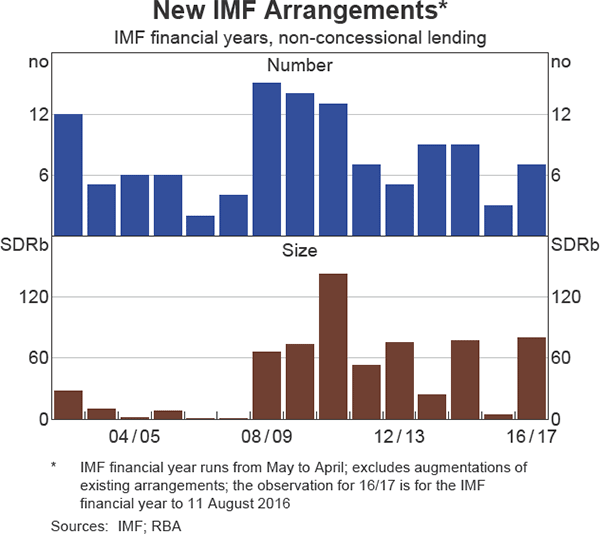
The IMF has continued to provide financial assistance to member countries, although the total number and size of new lending arrangements (excluding concessional facilities) declined in the IMF's 2015/16 financial year (which runs from May to April) to their lowest levels since the onset of the global financial crisis. New lending has, however, picked up again in the 2016/17 IMF financial year to date.
The recent pick-up in new lending has been accompanied by an increase in IMF credit outstanding, following declines over the previous four consecutive IMF financial years. At the end of July 2016, IMF credit outstanding was SDR55 billion, around 60 per cent of which was accounted for by Greece, Portugal and Ukraine.
Executives' Meeting of East Asia-Pacific Central Banks (EMEAP)
Purpose
EMEAP brings together central banks from 11 economies in the east Asia-Pacific region – Australia, China, Hong Kong SAR, Indonesia, Japan, Korea, Malaysia, New Zealand, the Philippines, Singapore and Thailand – to discuss issues relevant to monetary policy, financial markets, financial stability and payments systems in the region.
Reserve Bank Involvement
The Reserve Bank participates in EMEAP at a number of levels, including at the Governor and Deputy Governor levels.
Senior staff also participate in the EMEAP Working Groups on Financial Markets, Banking Supervision, and Payment and Settlement Systems, and meetings of IT Directors.
The EMEAP meetings consist of the Governors' and the Deputies' meetings, as well as the Monetary and Financial Stability Committee (MFSC) meeting. Support is provided by several working groups, which focus on a wide range of central banking issues.
The Reserve Bank hosted the 50th EMEAP Deputies' Meeting in Sydney in April 2016. At the Deputies' and MFSC meetings during the past year, members discussed a range of topics, including the impact of economic and financial market developments in China, the risks associated with current monetary policy settings in the advanced economies, volatility in global financial markets and the broader growth outlook for the region. These groups also continued to maintain close relationships with international institutions such as the IMF and the BIS through regular dialogue on topical issues.
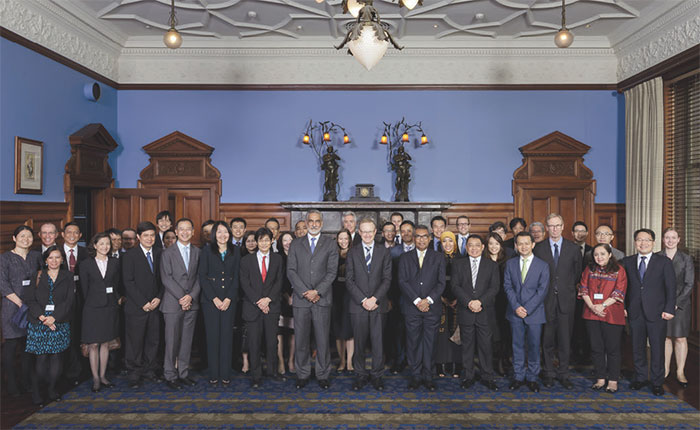

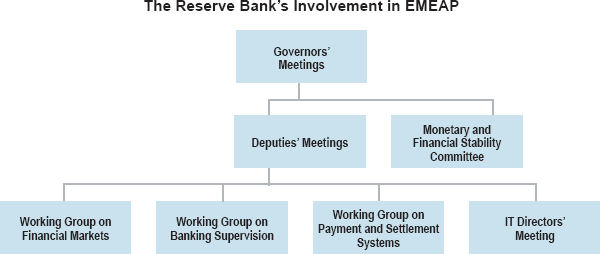
The Working Group on Financial Markets focuses on the analysis and development of foreign exchange, money and bond markets in the region. Every second meeting of this group is held in conjunction with the BIS Financial Markets Forum. In the past year, the group has continued to hold regular discussions on the impact of global policy developments and regulatory reform measures on regional financial markets, with a particular focus on assessing the impact of mandatory trading rules on OTC derivative markets and the impact of liquidity regulations on market functioning and central bank operations. The group has also continued its work on developing local currency-corporate bond markets, through the Asian Bond Fund (ABF) Initiative. On 1 July 2016, EMEAP announced the closure of ABF1, which invests in US dollar-denominated securities, with the funds of member central banks (including the Reserve Bank) being transferred to ABF2, which invests in local currency-denominated securities (see the chapter on ‘Operations in Financial Markets’ for further detail).
The Working Group on Banking Supervision (which also comprises representatives of EMEAP members' prudential regulators, including APRA) provides a regional forum for sharing experiences about best practices in banking supervision. The group discussed several issues over the past year, including banking stability in the region, the implementation of international reforms, such as Basel III and OTC derivatives market reforms, recovery and resolution planning, and differences in bank business models across regions.
The Working Group on Payment and Settlement Systems has focused on monitoring progress and sharing information on members' implementation of the G20 OTC derivatives market reforms and examining potential oversight issues arising from real-time retail payment systems.
The IT Directors' Meeting provides a forum for discussions on developments in information technology and their implications for central banks. Recent meetings have focused on enhancing cyber resilience and building information technology capabilities.
Organisation for Economic Co-operation and Development (OECD)
Purpose
The OECD comprises the governments of 35 countries and is committed to promoting policies that improve economic and social development globally.
Reserve Bank Involvement
The Reserve Bank's Chief Representative in Europe is a member of the OECD's Committee on Financial Markets.
The OECD Committee on Financial Markets is responsible for financial market issues and aims to promote efficient, open, stable and sound financial systems. In the past year, the Committee has discussed OECD work on financial sector guarantees, long-term investment financing, green financing and developments in the structure and efficiency of financial markets.
Technical Cooperation and Engagement in the Asia-Pacific Region
The Government Partnership Fund (GPF)
Purpose
The Australian Government's GPF program has supported an exchange of skills and knowledge between Australian public sector institutions and their Indonesian counterparts through a series of attachments and workshops since 2005/06.
Reserve Bank Involvement
In 2015/16, a total of eight Bank Indonesia staff members were attached to the Reserve Bank, covering the areas of economic analysis, financial markets, corporate services, communications, risk management and auditing. These visits brought the total number of individual attachments since the start of the program to 190.
The Reserve Bank fosters close ties with South Pacific countries through participation in Governor-level meetings, staff exchanges and the provision of technical assistance across a wide range of central banking issues. During the past year, the Bank's Brisbane Office hosted a visit of staff from the Reserve Bank of Fiji to discuss the Bank's operations and research program. This visit was part of a Griffith University program that seeks to strengthen relations between Australian institutions and the central banks of the South Pacific. Several staff members also participated in a conference organised by Griffith University as part of this program. The conference, which was also attended by representatives from a range of South Pacific central banks, discussed some of the opportunities and challenges for central banking in the region. A staff member also completed a term as a Visiting Research Economist to the South East Asian Central Banks (SEACEN) Special Expert Group on Capital Flows, producing a research report that was subsequently published.
In December 2015, the Deputy Governor participated in the annual meeting of South Pacific Central Bank Governors. In addition to discussing recent economic developments in the region, there was considerable discussion of developments in remittance flows in the region. The Governors also met with the major regional commercial banks to discuss banking issues.
The Reserve Bank continued to provide financial support to an officer of the Bank of Papua New Guinea undertaking postgraduate studies at an Australian university in the area of economics, finance or computing. The Reserve Bank of Australia Graduate Scholarship was first awarded in 1992. The Bank also hosted a short-term attachment of officers from the Central Bank of Solomon Islands.
Bilateral Relations and Cooperation
As in previous years, the Reserve Bank received a number of visitors from overseas, predominantly from foreign central banks. The visits covered the full range of the Bank's activities and included delegations from Cambodia, China, Ireland, Japan, New Zealand, Solomon Islands, South Africa and Tanzania. As noted in the chapter on ‘Our People’, the Bank also hosted a number of secondees from the Bank of England, Bank for International Settlements, People's Bank of China, Reserve Bank of New Zealand and Royal Canadian Mounted Police. A number of Reserve Bank staff have been seconded to other central banks and various international organisations, which facilitates a valuable exchange of skills and expertise between the Bank and the broader global economic and financial policymaking community.